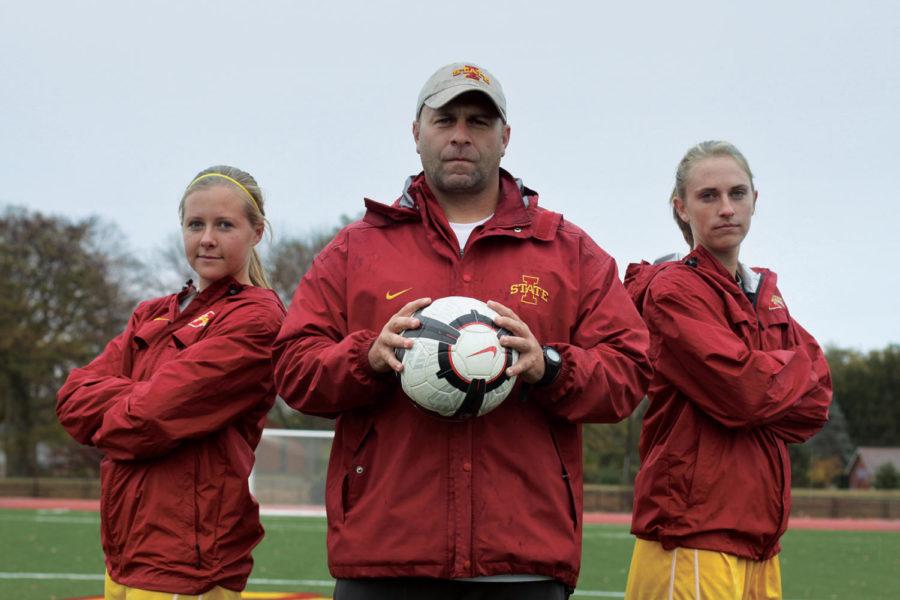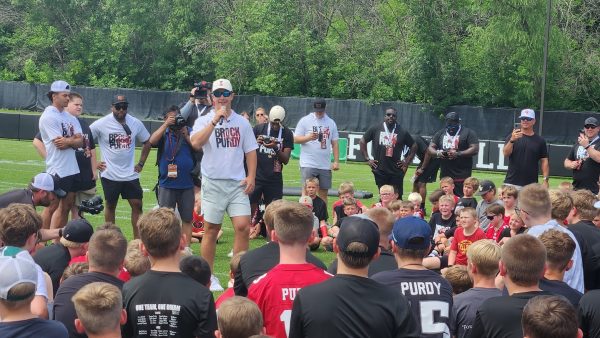Tony Minatta’s Fort Collins connection brings soccer talent to Iowa State
Photo: Huiling Wu/ Iowa State Daily
Tony Minatta is in his first season as assistant coach of the ISU soccer team and has already made a tremendous impact on the Cyclones’ coaching and recruiting landscape. Before coming to Iowa State, Minatta left a coaching legacy in Fort Collins, Colo., where he coached ISU players Susie Potterveld, left, and Jessica Stewart for three years and helped them get to Iowa State.
October 17, 2012
It’s all about connections.
Tony Minatta is only in his first season as assistant coach of the ISU soccer team, but he has already proven how beneficial his wealth of experience and relationships can be for the program.
Minatta, a native of Fort Collins, Colo., served as the assistant director of coaching at the Fort Collins Soccer Club from 2005–11, where he oversaw a total of 16 teams and became instrumental in many young players’ college recruitment and commitment.
Among these players are current ISU soccer players Jessica Stewart and Susie Potterveld. Minatta coached the duo for three years at the club level in high school and played an integral role in getting them to Iowa State as well.
“When it comes to recruiting, I’m very diligent in ensuring that all the players know who wants them to come to their school,” Minatta said. “I helped out a lot with just guiding them to go where they felt most comfortable and where their heart led them to go.”
Stewart, now a junior for the Cyclones, was a two-year captain on Minatta’s club team. The club qualified for the Colorado State Cup finals in both 2008 and 2009.
Although Stewart and Potterveld didn’t go to the same high school, they were able to form a strong relationship before coming to Iowa State, largely in part to their time playing club soccer together.
“We lived like 10 minutes apart from each other; we grew up together,” Potterveld said. “It was really great knowing that she was coming here. Just to have someone from home that understands you and that you can rely on and talk to about anything is great.”
Minatta’s connection to the Fort Collins soccer community has led to a number of advantages for the Cyclones’ recruiting strategy. Four more players from Minatta’s former program have committed to play at Iowa State next season.
Stewart and Potterveld provided a good example of what Iowa State would be like for the recruits.
“Once you build a connection with a particular club, they get to know those players,” Minatta said. “They talk to them about what it’s like, and that gives them a better feel for what it would be like.”
When Stewart and Potterveld were going through the recruiting process in high school, Minatta was of great assistance. He encouraged them to write to college coaches, prepared them to perform in front of recruiters and communicated with many college coaches himself; Minatta did what he could to help get his players to the next level.
“I hear so often now how hard it is to find colleges to go to, but I didn’t feel that way because Tony really laid ground work for us,” Stewart said. “He would make us email a certain amount of coaches before every tournament. I feel like everybody in the soccer world loves Tony, so it made it easy to communicate and build those bridges.”
Away from soccer, Minatta has a brief military past. He served in the U.S. Marine Corps 1993–96 and even won a medal for outstanding leadership during a 1996 overseas deployment.
Minatta was an Infantry Marine stationed at Camp Pendleton, Calif. During his six-month deployment, his battle group went on what is called a “WestPac float” around the Persian Gulf and Eastern Asia. His battle group went into Iraq for what Minatta referred to as “Operation Desert Strike.”
“It wasn’t a big one,” Minatta said. “I think we sent in 44 Tomahawk missiles and just sat on the border and kind of watched it happen.”
Minatta went through two six-month deployments before deciding against a military career. However, he did learn a number of lessons that he still uses today, both around and away from the soccer field.
“You can do a lot more than what you think you can,” Minatta said. “You can persevere through things. That’s kind of what I try to impart onto the team: That there’s always a way to get through it. No matter how hard things are or what’s going on, you can always find a way to overcome it.”

















